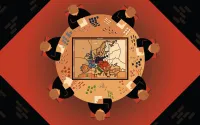26 September 2004
When it comes to weather news, it's been all-hurricane-all-the-time -- and under the pressure of storm after storm, news language has escalated. "Bizarre" and "strange" have been two recent words of choice in describing Florida's weather disasters. Yesterday, I heard a CBS radio announcer complain that "Mother Nature's piling on"; while the "chief meteorologist" for a local Florida TV station recently wrote, "But I think I echo the sentiment of many when I say, ‘Come on, Mother Nature, you are out of control!'"
When "Ivan the Terrible" threatened New Orleans, correspondents there had a field day discussing whether the city might literally disappear beneath the waves -- this was referred to as the "Atlantis scenario." Then there were those dramatic shots of gridlocked highways filled with fleeing refugees -- whether from New Orleans or the Florida Keys; there were the pans of massive post-storm destruction; the close-ups of weeping survivors; the dramatic tales of rescue; the interviews with people who had "lost everything"; the discussions of President Bush's trips to "comfort" the survivors; and above all, the endless shots of correspondents in rain slickers in front of dripping camera lenses trying to keep their balance in the pelting rain and swirling wind, shots which have become the sine qua non of hurricane coverage in recent years.
And yet something was missing. For the first time in history, four hurricanes – Charley, Frances, Ivan (the Terrible), and now Jeanne -- have smacked into Florida's long coastline one after another in a single hurricane season (not yet over), and here's the strangest thing of all: Forget that in March Brazil experienced the South Atlantic's first hurricane ever -- Brazilian meteorologists didn't even know what to name it; or that the Atlantic coast of Canada got whacked by Hurricane Juan, "the storm of the century," late last year (and the Canadian government suspects a link to global warming); or that the United States has already experienced a record number of tornados in 2004; or that Japan has had the worst season of typhoons in memory; or that Xtreme weather events have increased in recent years across the planet, including massive flooding in Europe, Bangladesh, and China, and a deathly summer heat wave that struck Europe in 2003. Forget the rising sea levels and the increased melt-off toward the poles. Forget that the head of at least one (hated) country in the path of Hurricane Ivan -- Fidel Castro -- was ready to warn his people about global warming and hurricanes, or that the Bush administration's closest ally, Tony Blair of Britain, made a major speech, widely ignored in the American press, labeling global warming a danger beyond compare. ("What is now plain is that the emission of greenhouse gases…is causing global warming at a rate that began as significant, has become alarming and is simply unsustainable in the long-term. And by long-term I do not mean centuries ahead. I mean within the lifetime of my children certainly; and possibly within my own. And by unsustainable, I do not mean a phenomenon causing problems of adjustment. I mean a challenge so far-reaching in its impact and irreversible in its destructive power, that it alters radically human existence.") Forget all that, and just focus for a moment on the fact that it took almost to the moment Jeanne hit Florida for our media to produce a spate of pieces that even speculated in passing about possible links between the hurricanes in Florida and global warming -- and almost all of those articles denied that there were any connections at all.
It's often been said that, in tossing the Kyoto Agreement out the Ozone hole, relaxing fuel-emission standards, burying or altering governmental global-warming research and the like, the Bush administration, with an Ivan-the-Terrible-style environmental record, has stuck its head in the proverbial sand (probably Tar sands at that). And this couldn't be truer. Ignoring global warming -- and so any preparations to safeguard the world for our children and grandchildren -- is but another form of global terrorism; it's a way of loading and locking another kind of weapon of mass destruction. But in this behavior, as it happens, the Bush administration isn't alone. The American mainstream media has been a major aider-and-abettor in the process.
We know that the President and his companions live in a bubble world. When he travels the foreign peripheries of our planet, for instance, central cities are emptied as he passes through them; and everywhere, from Washington to his campaign events, "security" regularly replaces reality in his life. At long last, the Iraqi fantasyland he inhabits has become a theme of the Kerry campaign. Kerry has begun to point out that those 15 of 18 Iraqi provinces Bush's chosen Prime Minister Iyad Allawi has declared "completely safe" exist only in their mutual brains. If, to one degree or another many Americans seem to live with George and Iyad in a counterfactual Green Zone of democracy and progress, at least there is now counter-evidence on the nightly news.
When it comes to the emission of greenhouse gases, and so to global warming, perhaps the single most pressing issue for the human future, there is next to no counter-evidence because our mainstream media lives inside the bubble too, and consequently so do the American people, at least those who don't make it to alternate or foreign sources of news via the Internet. With rare exceptions, even when aspects of global warming are reported on, the disconnect with our American world is severe. For instance, one night soon after Ivan cut its swath of destruction through the Caribbean and then Florida (only to partially re-form last week and threaten Florida again), I watched ABC prime-time news give over the first part of their broadcast to its depredations. Typically, however, there was not a mention of global warming. At the soft, human-interest end of the broadcast, however, there was indeed a story about Xtreme weather changes and global-warming clues -- in China.
The report focused on a group of Chinese scientists studying the melting of China's glaciers (which account for an estimated 15% of the earth's ice) and managed to indicate that China was already suffering from global-warming related Xtreme weather conditions. In the course of this, it was pointed out that the Chinese researchers had all watched the American global-warming catastrophe film The Day After Tomorrow in which much of the Northern Hemisphere is shown freezing over, and that, while they considered it exaggerated, they still saw a good deal to recommend in it. Naturally, ABC News never mentioned possible global warming links to the hurricanes just then bearing down on the United States.
Only the other day, the British Guardian had a piece on the same Chinese glacier study that began: "The world's highest ice fields are melting so quickly that they are on course to disappear within 100 years, driving up sea levels, increasing floods and turning verdant mountain slopes into deserts, Chinese scientists warned yesterday." This would be a significant catastrophe, resulting first in major flooding, later in desertification. The scientists have concluded, "Once the mountain ice was gone, rivers would start to dry up and ocean levels would rise, threatening coastal cities."
By now we know -- or should know anyway, that global warming is manifesting itself most powerfully at the peripheries of our planet -- in its frozen stretches where melting is occurring at startling rates, and in its archipelagic parts where rising sea levels, connected to that melting ice, are threatening to create instant "Atlantis scenarios" -- trailers, you might say, for the future fates of New Orleans, New York, Shanghai and other coastal cities. These areas of initial victimization are, however, places where peoples, often tribal and with no power whatsoever, live. At a recent hearing, Inuit Circumpolar Conference Chair Sheila Watt-Cloutier told the U.S. Senate Commerce Committee, "We find ourselves at the very cusp of a defining event in the history of this planet… The Earth is literally melting." And she pleaded with the assembled senators: "Use us as your early warning system. Use the Inuit story as a vehicle to reconnect us all so that we can understand the people and the planet are one."
But if the Inuit feel such urgency, it's not mirrored in our media world at all. When such a story manages to slip into our papers, as Andrew C. Revkin's Antarctic Glaciers Quicken Pace to Sea; Warming Is Cited did in last Friday's New York Times, placement tells all -- even when it has paragraphs right out of some catastrophe film. The Times piece, for instance, indicated that the expected change in sea levels from Antarctic glacial melting "already constitutes a slow-motion catastrophe for places like Bangladesh, New Orleans and low island nations, experts say. But the findings add weight to the idea that rising seas could be a fact of life for centuries to come, requiring serious reassessments of the human penchant for living along coasts." The Times editors nonetheless chose to place this global piece on page 24, the sixth and last page of its National Report (not counting the four full pages of ads in the section), appropriately opposite the obituaries.
Someday this will, of course, look like the most errant of follies (if anyone's looking). You might say that, as the Inuit canary expires in the mine, our response is to dig harder and faster, while those whose job it is to signal danger point the rest of us the other way. Among the few modest bright spots in a coal-dark Washington is that Senate Commerce Committee where Chairman John McCain has been pushing for some modest response to the dangers of global warming and the release of all those greenhouse gases. He said recently, in what is certainly an understatement, "We are the first generation to influence the climate and the last generation to escape the consequences."
By the 1980s, the interconnectedness of life on our planet had become one of the sentimental clichés of the environmental movement. But what of newspapers and TV shows that refuse to connect anything, that consider local and national weather catastrophes the most wonderful of stories -- like covering wars without the same danger levels -- but insist on treating them in fabulous isolation from other global developments? At first, no connections between the hurricanes pounding Florida and other global Xtreme weather events were even considered in the mainstream. Then, a new kind of weather article suddenly began appearing. A typical example -- from the South Florida Sun-Sentinel -- was David Fleshler's Scientists: Surge in hurricanes likely not caused by global warming which began:
"As hurricane after hurricane strikes the southeastern United States, many people wonder whether the rash of storms is the result of global warming.
"The answer from scientists: Probably not."
In it, the possibility that the hurricanes were indeed linked to global-warming trends was quickly raised -- only to be instantly shot down by quotes from a multitude of scientific experts. Oddly, this denial then freed the reporter to discuss a future moment when such a linkage might lead to catastrophe. ("But if global warming continues, it could inject a new element into these ancient meteorological cycles…. More significant, the study found that maximum precipitation could go up by about 34 percent, which ‘could have important future societal consequences'… Worsening the impact of these stronger hurricanes would be a rise in sea levels, also caused by global warming… etc.")
Indeed, it's true that four hurricanes in a historic package add up to no more than anecdotal evidence at this point; but the curious thing is that most of our reporters can't even discover a scientist who believes any linkage between the Florida hurricanes and global warming might be possible. On the other hand, the alternate media from Wired magazine to the Johns Hopkins News-Letter, and the foreign press have had little trouble populating either side of what is considered a debate about how immediate the effects of global warming may be. And elsewhere, especially on low-lying islands, other conclusions are certainly being drawn -- as the editorial page of a Jamaican paper indicates:
"Those of us who live in small island states understand the impact, the power, and danger, of these highly-charged storms. But the threat is not only from storms. The corollary to a warming world is melting ice caps, which translate to higher sea levels, which ultimately will mean the drowning of large areas of what we now call our homes. This applies not only to small, poor island states like Jamaica, but to the entire planet. Rich countries, too, are in danger."
Recently -- to offer congratulations where it's due -- two mainstream magazines, National Georgraphic and Business Week stepped out of line and made cover stories of global warming. Business Week's story ("Remarkably, business is far ahead of Congress and the White House. Some CEOs are already calling for once-unthinkable steps.") reflects fears in certain sectors of the business community, especially the insurance industry, about the potentially catastrophic financial impact of global warming.
But when it comes to hurricane coverage, in the far reaches of the mainstream press I've been able to uncover but one balanced, speculative piece (Warning in the Winds) suggesting possible links between our "strange" hurricane season and global warming -- and that appeared in the Washington Post Sunday Outlook section. Unsurprisingly, it was written not by an American, but by Mark Lynas, a British journalist who has also produced a book on the subject High Tide: The Truth About Our Climate Crisis:
"Watching storm after powerful storm plow into the U.S. coastline this year, I can't help wondering if the world's weather is actually trying to tell us something… Buried deep in the Web site of the National Oceanic and Atmospheric Administration (NOAA) is a graph that shows how tropical Atlantic sea surface temperatures have steadily risen between 2000 and 2004. NOAA classifies all but one of these hurricane seasons as "above normal" -- the exception is 2002, which suffered the hurricane-suppressing influence of a weak El Niño, the warm-water current that occasionally crosses the Pacific Ocean from west to east. To many, this suggests a global warming fingerprint: The accumulation of greenhouse gases -- principally carbon dioxide -- has driven world temperatures to new heights (2002 and 2003 tied for second place after 1998 as the warmest years ever). The seas are slowly heating up, too, providing more energy for tropical storms."
The Post, however, also had one of those no-connection-at-all-say-the-experts pieces in its news pages (2 Storms In Florida Not Seen As Trend, Experts Don't Fault Global Warming).
Perhaps it's the fact that global-warming math is so self-evident -- and so devastating -- that causes our media so insistently to look the other way. We in the United States make up 4% of humanity and yet are responsible for 25% of global greenhouse emissions. Facing the phenomenon of global warming, we have actually upped our greenhouse emission patterns, created vehicles that use yet more carbon-dioxide producing fossil fuels for less punch to the mile, made no serious national efforts at fossil-fuel conservation, put no significant national funds into quick-fix programs to find less harmful, more sustainable ways to run our world, and turned global warming into a money-making night at the movies – Nightmare on Earth Street. It's not a pretty record, either for the Bush Administration or for the media.
So welcome to the bubbledome of folly. At the moment, it's hard not to suspect that if the Atlantis scenario kicked in and New Orleans disappeared under water few connections would be made -- though who can doubt that a greenhouse-gas coughing Bourbon Street replica would be recreated in Las Vegas. Being in denial, if you don't live in Florida or along the Gulf coast where the American bubble has just been pierced, is still kind of fun. But at least remember to alert the Homeland Security Agency to dig us all a giant, fortified hole to jump into when the moment comes. Just make sure it's inland and well above sea level. Tom






